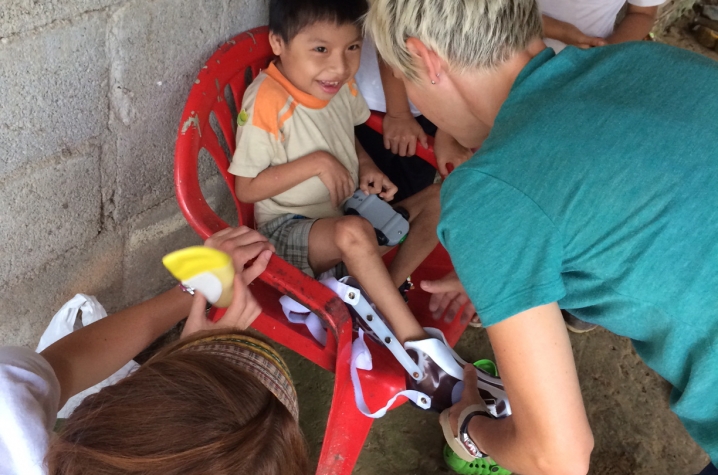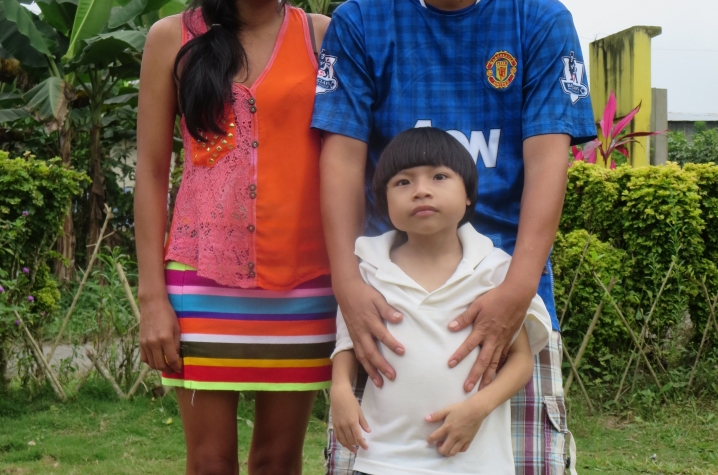Interprofessional Shoulder to Shoulder Global Team Helps Child Take First Steps
LEXINGTON, Ky. (Nov. 5, 2014) - Finding out your child is seriously ill would be heartrending for any parent. But what if your child became gravely ill at just 15 days old, and medical professionals gave you little hope that he would survive? What if those first few years passed, and your child never took his first steps and you had limited or no access to medical care?
This scenario was reality for Telmo and Rita Aquavil, parents of Arlyn. The family lives in Congama, a rural Tsáchilas village, near Santo Domingo, Ecuador. Arlyn developed medical problems 15 days after his birth, and doctors told his parents that he would not live. The Aquavils took their baby home, and, against all odds, Arlyn survived. He did not receive any further medical assessment or care during his first six years of life.
In May 2014, a health brigade from Shoulder to Should Global (STSG) visited Santo Domingo. Through STSG, interprofessional teams of University of Kentucky students, faculty, staff and community members provide care in impoverished communities in areas such as medicine, dentistry, nursing, pharmacy, physical therapy, communication disorders and public health.
It was on this trip that Audrey Johnson, UK College of Health Sciences Physical Therapy alumna, met Arlyn, who at six-years-old was unable to walk.
“From a physical therapy perspective, he had low tone and developmental delays,” said Johnson, who has been traveling with international medical brigades since 2008 and is currently a doctoral student in the Health Sciences Rehabilitation Sciences Ph.D. Program. “He was unable to walk or crawl, and had poor trunk and head control. He also had contractures [tightening or shortening of a body part] in his feet that impaired his movement and mobility.”
During the physical therapy assessment, Johnson showed Arlyn’s father how to stretch his son’s feet, and how to help him crawl and stand. The family was given a yoga mat, so that Arlyn could practice the prescribed exercises and movements on their home’s uneven dirt floor. He was also given a modified walker to use as a standing frame.
In addition to receiving physical therapy, Arlyn was evaluated by a pediatric neurologist in Quito, the capital city of Ecuador. Arlyn was diagnosed with an intellectual disability and a seizure disorder. After receiving medication to control his seizures, Arlyn made miraculous progress. Within two weeks, Arlyn was walking.
“All the stars aligned for STSG to help this boy walk for the first time," said Dr. Thomas Young, the Jim and Suzanne Elliott & Family Professor of Pediatrics at the UK College of Medicine, who led the first medical brigade to Ecuador in 2002 with a small group of six committed participants. "Our Brigade in his village, physical therapy, pediatrics, Peace Corps volunteer, linkage to a pediatric neurologist, and follow-up at our STSG Health Center in Santo Domingo.”
Arlyn’s story is one example of the profound effect Shoulder to Shoulder Global has on the lives of those it serves. Since 2002, STSG has grown, serving more than 1,500 patients, with more than 100 volunteers participating in its three annual health brigades to Ecuador.
Additionally, STSG was instrumental in establishing the Centro Médico Hombro a Hombro in Ecuador, a health center opened in 2007, which provides medical care, prevention services, oral health, and school-based services in the community. The center helps to ensure access to continuous health care services year-round.
Johnson is grateful for her experiences with STSG, which gave her the opportunity to engage with and mentor students interested in service learning. She believes STSG is focused on meeting the long-term health care needs of the community, and it is a worthy cause.







